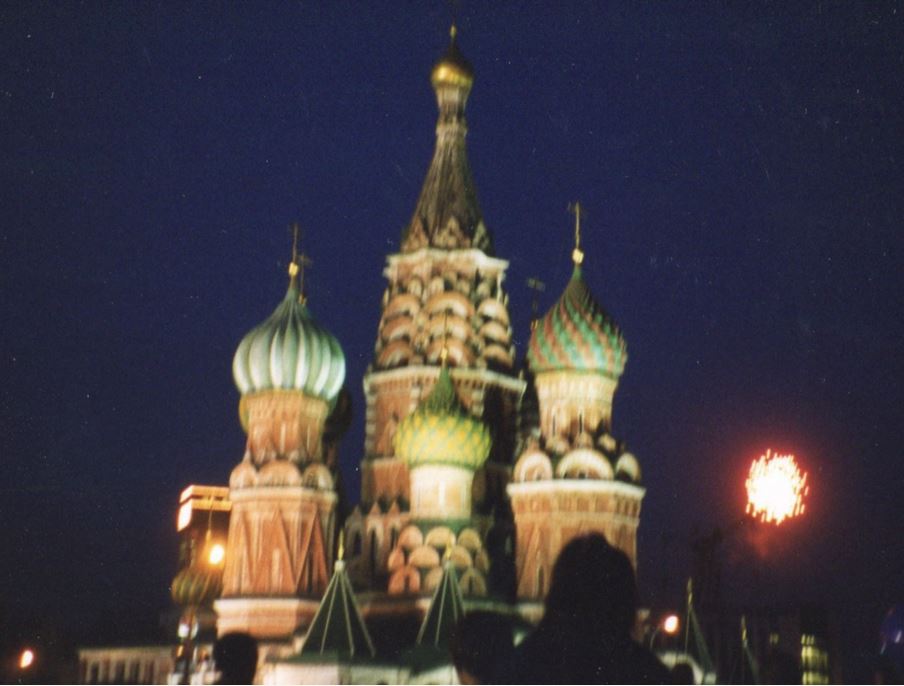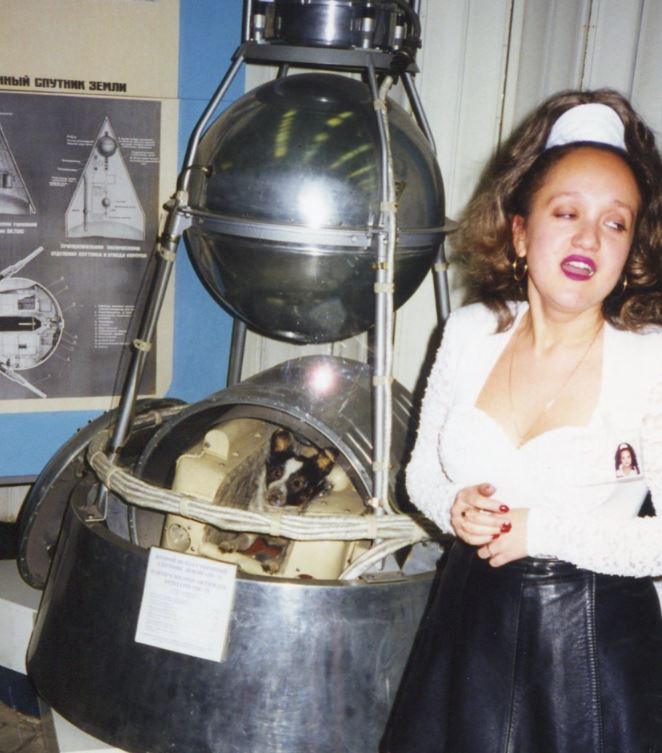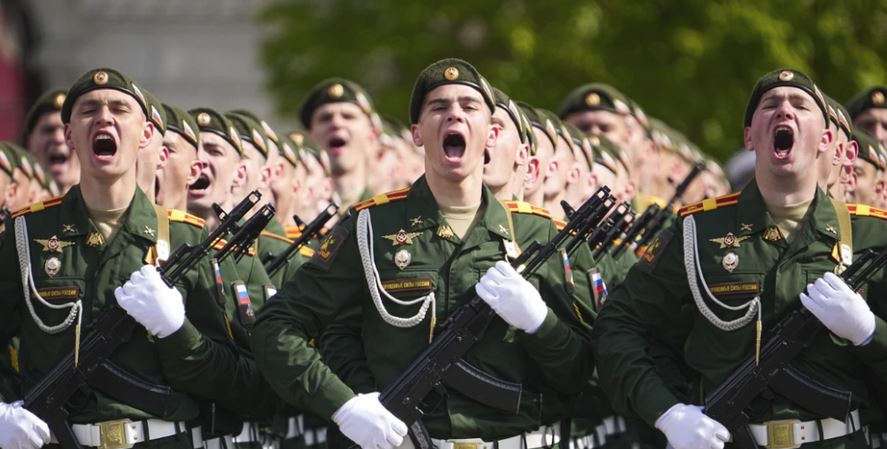Victory Day

(May 9th is Victory Day in what was known for many years as the Soviet Union. It commemorates the defeat of a savage despot who invaded the Russian homeland and the more successful Soviet invasion of Poland and eventual conquest of Berlin. Red Square Victory Day photo 1998 SOCOTRA).
We have not shared the image above since the Industrial College of the Armed Forces (ICAF) SEMINAR 17, SPACE, dragged its collective butts back from a Moscow trip at the end of the previous century. We didn’t spread it around at the time because as you can see, it is a little blurry and not a particularly good shot.
Contained in the darkness of that Red Square night, there is only a single and somewhat forlorn burst of fireworks visible to the right of the historic onion domes. The panoramas of Red Square are better covered in daylight, of which we had more than expected, since the Seminar trip to visit space-industry sights up in Leningrad had been abruptly cancelled due to some simmering dispute between Washington and Moscow.
We were used to those sorts of things in those days, and that is useful considering the changes apparent today. But today’s iteration of the celebration has re-emerged as a symbol of Russia’s proud tradition and Vladimir Putin’s personal contribution in bringing back greatness after the greater Soviet collapse in 1991.
This morning, for Victory Day 2024, Russia wrapped itself in patriotic pageantry as President Putin celebrated his re-inauguration as the Russian Czar in consonance with that of the defeat of Nazi Germany in World War II. He hailed his own victory by cheering the bravery of his forces fighting in Ukraine. He took a moment to also blast the West for “fueling conflicts around the world.”
We have been talking about the concept of “change” around the picnic table out on the concrete Patio after the morning production meeting of the Writer’s Section. That is the transition from organizing the afternoon and determining whether or not to have one or three martinis with lunch.
This Victory Day is change personified. We attended the celebration in 1998 Moscow with our own feeling of victory. We represented the Industrial College, which demonstrates the essence of change. Back then, the title of the school was direct albeit plebian in tone. It represented an effort by the US military educate its leadership on the essential role of logistics support in accomplishing military missions.
There were a variety of crucial topics divided by Seminar groups. Technology, production and transportation were some of them. Our group was assembled of those interested in civilian space-launch capabilities, since that seemed to be an area of growth with the Cold War then over
Events have born that contention out with Elon Musk and a host of orbiat innovation. The trips to launch complexes in the U.S. France and Russia were an enticement. This is what some of them looked like, including Natasha, the Russian spokeswoman:

(Our guide Natasha and her dog Mika explain the technology of former Soviet satellites in Moscow. Photo Socotra. Fashions: Moscow Institute of Industrial Fashion. Photo Socotra.)
We filled up the suddenly empty time between cancelled flight from Moscow with ordinary tourist activities. The ones with great vistas tinged with a certain vodka-induced haze. On our return, we were certified as experts in what could someday be termed “civilian space launch” capabilities, innovative push up undergarments, space dogs and frequent flyer miles.
We proudly learned the school’s motto: “Claws-O-Witz.” It was a tribute to the great German logistician, not our touch football team.
The Pentagon also recognized ‘change’ was at hand and the institution needed to adapt to new times after 9/11. The name of the institution went back to its founding days as the Army Industrial College (AIC) in 1924, under the leadership of the legendary logistician and Wall Street tycoon Bernard Baruch. The problems of mobilization for the great European conflict of World War demonstrated a need for better understanding of how to raise and channel the industrial base to win wars. It went joint to accommodate the needs of both Army and Navy as ICAF, long before the creation of the Air Force
Our class was part of a line that went back to the first class of nine students more than seventy years before we arrived at Ft. McNair. ICAF awarded us Master of Science degrees in what they termed “National Resource Strategy,” which included special emphasis on material acquisition, joint logistics and integration.
After our graduation and return to duties devoted to more ordinary national security matters, the school took up the matter of strategic messaging in support of national resource management. The name of the school on the other side of the Potomac was changed to honor one of the great figures of the generation we know honor as “The Greatest.” In 2012, ICAF became the Dwight D. Eisenhower School for National Security and Resource Strategy.”
Alumni were not contacted about what appears to be a certain redundancy in the new name, but we are not changing the wording on the diplomas that have been gathering dust in the storage locker.
So, the memories of that night in Moscow darkness showered with the bright light of explosions a quarter century ago is bright on this cloudy morning. We pay tribute to a shared triumph over the forces of fascism in 1945, to those who struggled in the long chilly aftermath, and to the rising generation who will have to deal with the changes to come. Some of those were in the media messaging this morning, as students here in town are calling- earnestly- for the guillotine of their university president.
Some of the next generation of players in national strategies are already getting ready.

(Russian Victory Day Parade preparations, 05 May 2024. AP Photo/Alexander Zemlianichenko).
Copyright 2024 Vic Socotra
www.vicsocotra.com
